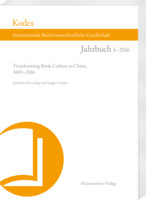|
|
Download:
Please note: With adding digital Products to your cart
the payment will be handled via PayPal. The download will be provided after the payment is confirmed. Kodex, the Yearbook of the International Book Society edited by Christine Haug (LMU Munich) and Vincent Kaufmann (University of St. Gallen), aims to investigate the past, present and future of the medium “book” in a systematic and interdisciplinary manner. The sixth volume of Kodex focuses, for the first time, on the globalization of the book market. The guest editors Daria Berg and Giorgio Strafella (University of St. Gallen) have collected fifteen contributions in English on “book culture in China” – a topic that tends to elude the Western reader due to the language barrier. With this volume Kodex wants to contribute to a change in perception. The volume presents the latest findings on Chinese book culture from top international research. The fifteen contributions by leading scholars provide a panorama of the latest trends, trying to create a roadmap to enhance our understanding of China’s book culture in the past and in the present. The first part of the volume traces the historical development of the book market in China. It explores the publishing industry, book collections, libraries and writings from the late Ming era (1366–1644) until the Cultural Revolution (1966–1976) and the end of the Mao era (1949–1976). The second part focuses on current literary practices in the conflicting areas of China’s postsocialist society, government censorship, and a growing digital public sphere in the age of Web 2.0.
|
|||||||||||||||||||||||||||||||||||||||||




